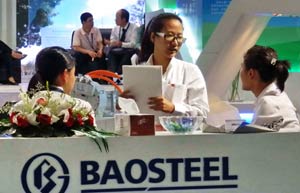Taobao, a C2C online platform owned by e-commerce giant Alibaba Group Holding Ltd, now provides not only small items but also bulk commodities such as steel products.
E-commerce business, highly accepted by the market, is transforming the surplus steel industry of China.
China has 580 bulk commodity e-commerce platforms, about 100 of which are involved in the steel business. Steel e-commerce is a bellwether among all the bulk commodity e-commerce, said Cai Jin, vice-chairman of the China Federation of Logistics and Purchasing.
The online steel business is estimated to account for 10 percent of China's total steel trade. For instance, Zhaogang.com has attracted 40 steel mills to do business on the website, which together traded 860,000 metric tons of steel with total value of 2.9 billion yuan ($467.74 million).
 |
 |
Tmall is China's top B2C platform under the Alibaba Group. Steel trade online between steel mills and end-users can cut distribution costs by one-half compared with the traditional trader-agent mode, which particularly fits the present situation of meagerprofit, said Wuhan Steel general manager assistant Huang Zhiming.
China's major steelmakers reversed from losses to profits in May, after losing 1.14 billion yuan in the first four months, according to official data.
Senior analysts said that China's steel industry, with a long-term excess production capacity and tough transformation, is turning into a buyer's market from a seller's one, forcing the steel mills to turn to e-commerce.
This has attracted social capital to accelerate building steel e-commerce platforms.
In the meantime, experts believe that e-commerce wouldn't replace all the traditional steel distribution channels, despite its rapid growth.
E-commerce can get quick returns with small margins and is very efficient in selling standardized steel products, while it is still better to buy individualized steel products offline, said Cheng Ming, dean of the Iron and Steel New Technology Institute of New Technology under Wuhan University of Science and Technology.
Analysts also worry the booming development of steel e-commerce platforms could lead to an excess.
Currently, the Ministry of Industry and Information Technology monitors and supports 30 steel e-commerce platforms. Only three to five of them are expected to keep growing and stay influential in the next few years, said ministry official Dong Baoqing.
